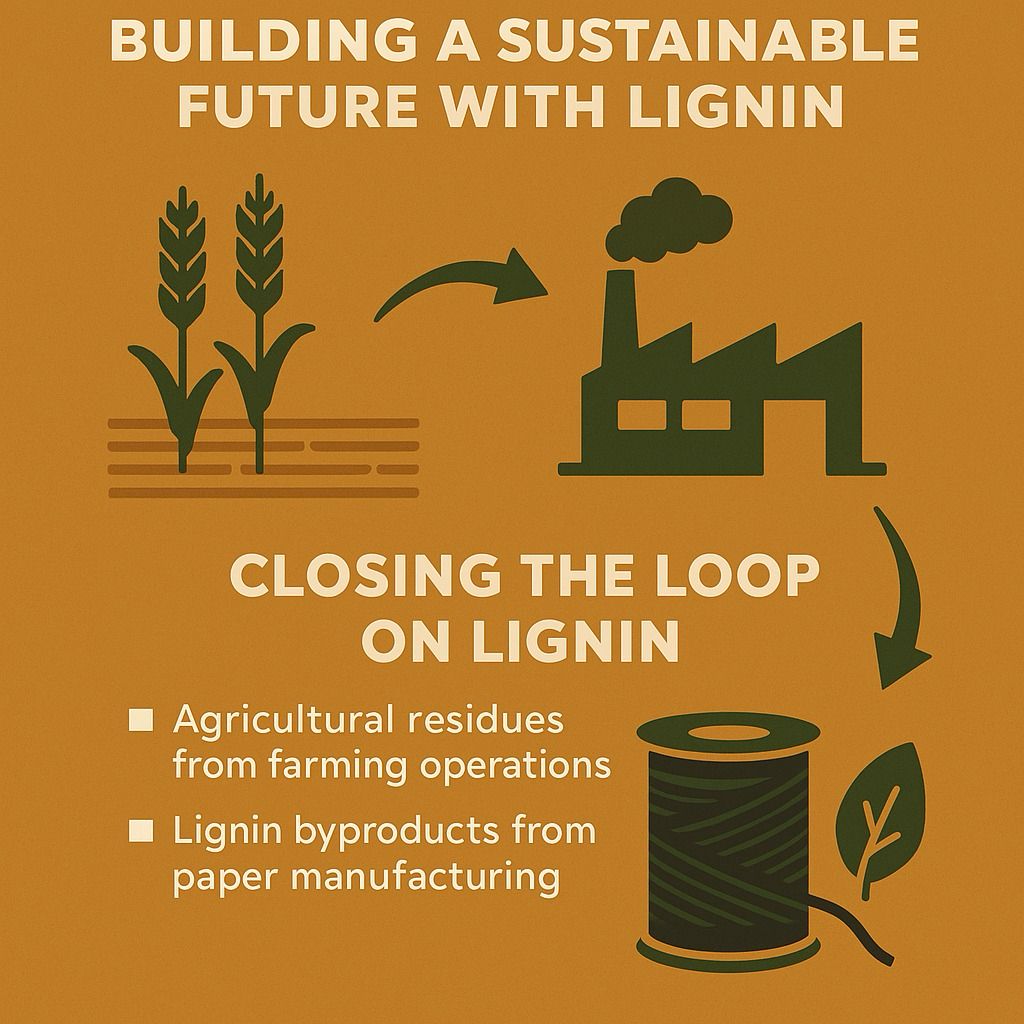
From Waste to Wonder: Building a Sustainable Future with Lignin
Across the world, two major industries face a common challenge – what to do with lignin. Farmers burn agricultural residues like wheat straw and rice husks, while paper mills discard millions of tons of lignin as a byproduct. This overlooked resource, nature’s own structural polymer, holds incredible potential we’re just beginning to tap.
At FarmLign, we see this not as waste, but as raw material for a materials revolution. Our initiative focuses on transforming both agricultural residues and industrial lignin from paper production into high-performance, plant-based carbon fibers. While others see disposal problems, we see solutions – solutions that could reduce our dependence on petroleum-based materials while creating new value from what was once considered waste.
Read more..
Closing the Loop on Lignin
Our approach addresses two major waste streams simultaneously:
- Agricultural residues from farming operations
- Lignin byproducts from paper manufacturing
By developing innovative conversion processes, we’re creating pathways to turn this abundant natural polymer into sustainable carbon fibers. The environmental benefits multiply when we consider the full picture: reduced burning in fields, less industrial waste, and fewer petroleum-derived materials.
A Collaborative Path Forward
The journey from concept to reality requires bringing together diverse expertise. We’re building connections between agricultural communities, paper industry partners, materials scientists, and sustainability advocates. Together, we can develop systems that make lignin valorization practical and economically viable.
This is more than an environmental initiative – it’s an opportunity to rethink how we view and value natural resources. By seeing lignin not as waste but as the foundation for green materials, we open doors to innovative applications that benefit both people and planet.
Join the Movement
We’re at the beginning of an important transition in how we use and value lignin. Whether you’re involved in agriculture, paper production, materials science, or simply care about sustainable solutions, your perspective matters.



In the quest for sustainability and innovation, the concept of smart villages is gaining traction worldwide. These forward-thinking communities leverage modern technology and renewable energy sources to enhance the quality of life for their residents while minimizing environmental impact.
Central to the smart village concept is the use of renewable energy, particularly solar energy. Azerbaijan is endowed with a favorable climate, boasting abundant sunshine throughout the year. This makes solar energy a viable and effective solution for powering smart villages.
In addition to solar power, other renewable energy sources, such as wind and biomass, can be integrated into the smart village framework. Azerbaijan, where the rich natural resources and a growing interest in sustainability intersect, the potential for smart villages is immense.
The implementation of smart village concepts in Azerbaijan holds significant promise. With a growing focus on rural development and sustainable practices, the Azerbaijani government and various stakeholders are increasingly interested in investing in this field.



On behalf of the Innovation and Digital Development Association, our project leader had the honor of representing Turkey at the 14th Kuyavian-Pomeranian Social Economy Forum, held in Torun, Poland. At this important event, we were specifically invited to present our local and international projects, particularly Digital Elders and Hippotherapy Turkey, which are part of our Erasmus+ initiatives.
Read more
The forum opened with inspiring speeches from distinguished leaders such as Piotr Całbecki, Marshal of the Kuyavian-Pomeranian Voivodeship, Elżbieta Piniewska, Chairwoman of the Voivodeship Assembly, Katarzyna Nowakowska, Undersecretary of State at the Ministry of Family, Labor, and Social Policy, and Andrzej Radniecki, Director of the Department of Social Economy. Their talks focused on the future of social economy, the role of local governments, and the development of social services.
During the forum, we also participated in collaboration sessions with social economy representatives from various countries. These discussions were highly productive, focusing on strengthening cooperation between local governments and the private sector in the field of social economy. Our projects, particularly those promoting digital integration for the elderly and hippotherapy for various age groups, received significant interest.
Throughout the event, we had the opportunity to network with key figures at both national and international levels, establishing valuable partnerships for our future projects. Representing Turkey on this global stage was an honor, as we proudly showcased the achievements of our country in the field of social services.






This project aims to create concrete resources to increase the social competencies of youth workers on the international platform by developing the skills necessary for the employment of disadvantaged young people aged 13-24 in the social inclusion of disadvantaged young people through VR technologies, to support the institutions and experts working in this field with quality management and innovative methods and to reveal sustainable studies in the field.



On the final day of our Youth Exchange Program, we proudly celebrated the achievements of all participants with a special Certificates Ceremony. Youthpass and Participation Certificates were awarded to the distinguished participants, recognizing their commitment and hard work throughout the project.
The members and volunteers of the Innovation and Digital Development Association successfully completed the exchange program, showcasing their dedication to learning, collaboration, and growth. As we concluded the fifth day, we reflected on the collective effort that led to this achievement. Congratulations to all involved – your hard work and teamwork have truly paid off.
We are proud of the invaluable experiences shared, the skills developed, and the strong bonds formed during this program. This is just the beginning of many future successes for our participants and the association as a whole. Well done, everyone!

KA210-YOU :STEMspark: Igniting Passion, Empowering Ukrainian Women in Science .The project aims to increase the employability and life participation of war-affected refugee girls and women in our country by enhancing their knowledge and skills in the fields of ecology and sustainability, as well as developing their STEAM (Science, Technology, Engineering, Arts, and Mathematics) skills through prototyping. It also seeks to encourage their active participation in social integration and socio-economic life.








